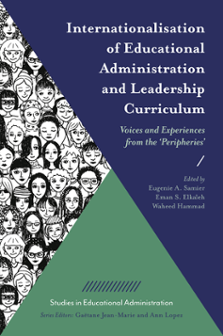
Index
Internationalisation of Educational Administration and Leadership Curriculum
ISBN: 978-1-83909-865-9, eISBN: 978-1-83909-864-2
Publication date: 23 August 2021
Citation
(2021), "Index", Samier, E.A., Elkaleh, E.S. and Hammad, W. (Ed.) Internationalisation of Educational Administration and Leadership Curriculum (Studies in Educational Administration), Emerald Publishing Limited, Leeds, pp. 237-242. https://doi.org/10.1108/978-1-83909-864-220211014
Publisher
:Emerald Publishing Limited
Copyright © 2021 Eugenie A. Samier, Eman S. ElKaleh, Waheed Hammad. Published under exclusive licence
INDEX
- Prelims
- Chapter 1 Editors' Critical Introduction: Conceptions of Internationalisation Challenging Dominant Knowledge Traditions
- Section 1 Theoretical Foundations and Critiques
- Chapter 2 Humanistic Knowledge Traditions That Can Inform Educational Administration and Leadership Curricula: Ancient, Islamic, Confucian, Buddhist and European Approaches
- Chapter 3 Critical and Postcolonial Approaches to Educational Administration Curriculum and Pedagogy
- Chapter 4 Internationalisation Models and Strategies in Higher Education: A Conceptual Model for Internationalising the Curriculum
- Chapter 5 Towards an Educational Administration Curriculum That Addresses Maladministration in Internationalised Higher Education
- Section 2 Country Cases
- Chapter 6 Aligning ‘International’ Standards with ‘National’ Educational Leadership Preparation Needs: The Case of a Master's Programme in Oman
- Chapter 7 Mapping the Terrain of Training and Appointment of Educational Leaders in the Turkish Context: An Historical Perspective
- Chapter 8 Rethinking Knowledge Hierarchies in Teaching Educational Leadership to International Students
- Chapter 9 Educational Administration and Leadership in Greece and the UK: A Comparative Study on the Interplay between the Policy Context and the Relevant Postgraduate Courses in the Two Countries
- Chapter 10 To Achieve Gender Equality in Organisations: A Swedish Case on an Important Aspect of Educational Leadership
- Chapter 11 African Philosophies of Education and Their Relevance in Developing an International Leadership Curriculum: A Guide for Educational Systems, Schools and School Leaders
- Index